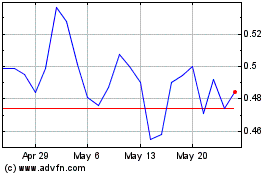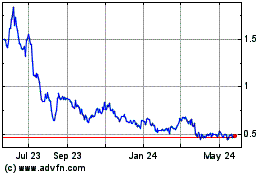Salarius Pharmaceuticals, Inc. (Nasdaq: SLRX), a clinical-stage
biopharmaceutical company developing potential new medicines for
patients with pediatric cancers, solid tumors, and other cancers,
announced today that Fox Chase Cancer Center in Philadelphia, PA,
has been added as an active trial site for the dose-expansion stage
of the ongoing clinical trial evaluating the company’s lead drug
candidate, seclidemstat, in patients with relapsed or
refractory Ewing sarcoma and advanced FET-rearranged sarcomas.
The addition of Fox Chase expands to nine the
number of active sites participating in the open label trial
intended to assess seclidemstat at the recommended Phase 2 dose
(RP2D). Patient recruitment is now underway at all sites, and the
first patients in the dose-expansion stage of the clinical trial
have been dosed.
Seclidemstat is a novel, oral, reversible
inhibitor of lysine-specific histone demethylase 1 (LSD1), an
enzyme that has been shown to play a key role in the development
and progression of several cancers.
Per the amended protocol, the trial’s
dose-expansion stage now includes three patient arms. The first arm
will enroll up to 30 patients with Ewing sarcoma, a rare and deadly
pediatric bone cancer, and will investigate seclidemstat in
combination with topotecan and cyclophosphamide, a commonly used
second- and third- line chemotherapy regimen. Salarius believes
data released during ASCO 2021 demonstrated synergy in an Ewing
sarcoma cell line when seclidemstat was used in combination with
topotecan and cyclophosphamide. Salarius believes this treatment
combination and its use as a second- and third-line therapy could
greatly expand the addressable patient population for seclidemstat
and improve outcomes by allowing physicians to use seclidemstat
earlier in the Ewing sarcoma continuum of care.
The trial’s second patient arm will investigate
seclidemstat as a single agent in up to 15 patients with myxoid
liposarcoma. The third patient arm will investigate seclidemstat as
a single agent in up to 15 patients with select sarcomas that share
a biology similar to Ewing sarcoma, also referred to as
FET-rearranged or Ewing-related sarcomas. In data released at ASCO
2021, a subset of patients with advanced FET-rearranged sarcomas
treated with single-agent seclidemstat resulted in stable disease
(SD) and prolonged time to progression (TTP) which Salarius
believes suggests disease control, a clinically relevant endpoint
for soft tissue sarcomas.
All patient arms are designed to evaluate safety
and efficacy endpoints in patients with advanced disease. Salarius
expects to report data in 2022 and provide earlier updates if
possible.
“We are excited to be working with Salarius and
look forward to exploring the potential of seclidemstat and its
ability to inhibit the LSD1 enzyme,” stated Johnathan Whetstine,
Ph.D., Director, Cancer Epigenetics Institute, Fox Chase Cancer
Center. “Based on our extensive research into the epigenetic causes
of cancer, we believe LSD1 inhibition holds great promise in the
treatment of many cancers. We believe data from preclinical studies
using Ewing sarcoma cell lines has demonstrated the molecule’s
ability to hit two aspects of the enzyme simultaneously. This,
added to clinical data showing drug activity across Ewing and other
sarcomas, support the further exploration of seclidemstat in these
high unmet need patient populations.” Dr. Whetstine is a consultant
to Salarius and has also served in an advisory capacity.
David Arthur, CEO of Salarius Pharmaceuticals,
stated, “Our goal is to make a difference in the lives of patients
fighting cancer, and we believe the data we have released to date
has been compelling. To now be working with a cancer research
center of the caliber of Fox Chase Cancer Center further affirms
the potential of seclidemstat to have a meaningful impact on the
treatment of Ewing sarcoma and other cancers. We look forward to
providing additional updates throughout 2021.”
Trial enrollment at Fox Chase will be led by
Margaret von Mehren, M.D., Chief of Sarcoma Oncology.
In addition to Fox Chase, active clinical trial
site locations include, Johns Hopkins All Children’s Hospital in
St. Petersburg, FL; Children’s Hospital of Los Angeles in Los
Angeles, CA; Moffitt Cancer Center in Tampa, FL; Dana-Farber Cancer
Institute in Boston, MA; MD Anderson Cancer Center in Houston, TX;
Nationwide Children’s Hospital in Columbus, OH; Memorial Sloan
Kettering Cancer Center in New York City; and the Sarcoma Oncology
Center in Santa Monica, CA.
About Fox Chase Cancer
CenterThe Hospital of Fox Chase Cancer Center and its
affiliates (collectively “Fox Chase Cancer Center”), a member of
the Temple University Health System, is one of the leading cancer
research and treatment centers in the United States. Founded in
1904 in Philadelphia as one of the nation’s first cancer hospitals,
Fox Chase was also among the first institutions to be designated a
National Cancer Institute Comprehensive Cancer Center in 1974. The
recently founded Cancer Epigenetics Institute is a national hub for
epigenetics study and collaboration focused on mechanisms promoting
cancer and therapeutic resistance. Its mission is to facilitate
academic-to-industry and academic-to-academic partnerships with the
goal of promoting discovery in cancer epigenetics. Fox Chase
researchers have won the highest awards in their fields, including
two Nobel Prizes. Fox Chase physicians are also routinely
recognized in national rankings, and the Center’s nursing program
has received the Magnet recognition for excellence five consecutive
times. Today, Fox Chase conducts a broad array of nationally
competitive basic, translational, and clinical research, with
special programs in cancer prevention, detection, survivorship and
community outreach. It is the policy of Fox Chase Cancer Center,
that no one shall be excluded from or denied the benefits of or
participation in the delivery of quality medical care on the basis
of race, ethnicity, religion, sexual orientation, gender, gender
identity/expression, disability, age, ancestry, color, national
origin, physical ability, level of education, or source of
payment.
About Salarius
PharmaceuticalsSalarius Pharmaceuticals, Inc. is a
clinical-stage biopharmaceutical company developing cancer
therapies for patients in need of new treatment options. Salarius’
lead candidate, seclidemstat, is being studied as a potential
treatment for pediatric cancers, solid tumors and other cancers
with limited treatment options. Seclidemstat is currently in a
Phase 1/2 clinical trial for relapsed/refractory Ewing sarcoma and
select additional sarcomas that share a similar biology to Ewing
sarcoma, also referred to as Ewing-related or FET-rearranged
sarcomas. Seclidemstat has received Fast Track Designation, Orphan
Drug Designation and Rare Pediatric Disease Designation for Ewing
sarcoma from the U.S. Food and Drug Administration. Salarius is
also developing seclidemstat for several cancers with high unmet
medical need, with a second Phase 1/2 clinical study in advanced
solid tumors, including prostate, breast, and ovarian cancers.
Salarius has received financial support from the National Pediatric
Cancer Foundation to advance the Ewing sarcoma clinical program and
was also a recipient of a Product Development Award from the Cancer
Prevention and Research Institute of Texas (CPRIT). For more
information, please visit salariuspharma.com or follow Salarius on
Twitter and LinkedIn.
Forward-Looking
Statements This press release contains
“forward-looking statements” within the meaning of the Private
Securities Litigation Reform Act of 1995. All statements, other
than statements of historical facts, included in this press release
are forward-looking statements. These forward-looking statements
may be identified by terms such as “anticipate,” “potential,”
“progress,” “design,” “estimate,” “continue,” “will,” “aim,” “can,”
“believe,” “plan,” “allow,” “expect,” “intend,” “goal,” “provide,”
“able to,” “position,” “project,” “developing,” and similar terms
or expressions or the negative thereof. Examples of such statements
include, but are not limited to, statements relating to the
following: the company’s growth strategy; the ability to enroll
patients in any arm of the current clinical trials; the value and
efficacy of seclidemstat, either by itself or together with other
products, as a therapy in any indication; the status and
anticipated progress and milestones of the company’s clinical
trials; the anticipated readout of clinical trial results; the
expansion of the company’s clinical trials; and Salarius developing
seclidemstat for several cancers with high unmet medical need.
Salarius may not actually achieve the plans, carry out the
intentions or meet the expectations or objectives disclosed in the
forward-looking statements. You should not place undue reliance on
these forward-looking statements. These statements are subject to
risks and uncertainties which could cause actual results and
performance to differ materially from those discussed in the
forward-looking statements. These risks are described in Salarius’
filings with the Securities and Exchange Commission, including
those discussed in the company’s quarterly report on Form 10-Q for
the quarter ended March 31, 2021 and in the company’s annual report
on Form 10-K for the year ended December 31, 2020. The
forward-looking statements contained in this press release speak
only as of the date of this press release and are based on
management’s assumptions and estimates as of such date. Salarius
disclaims any intent or obligation to update these forward-looking
statements to reflect events or circumstances that exist after the
date on which they were made.
ContactTiberend Strategic Advisors, Inc.
Maureen McEnroe, CFA(212) 375-2664 mmcenroe@tiberend.com
Johanna Bennett (media
relations)(212) 375-2686 jbennett@tiberend.com
Fox Chase CancerAmy Babler(215) 280-0810amy.merves@fccc.edu
Salarius Pharmaceuticals (NASDAQ:SLRX)
Historical Stock Chart
From Mar 2025 to Apr 2025

Salarius Pharmaceuticals (NASDAQ:SLRX)
Historical Stock Chart
From Apr 2024 to Apr 2025
